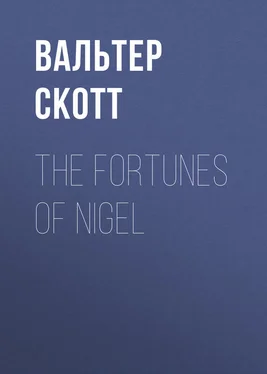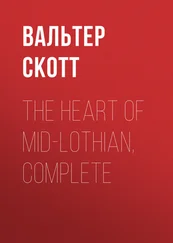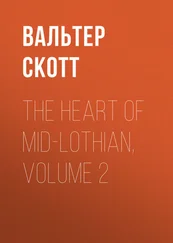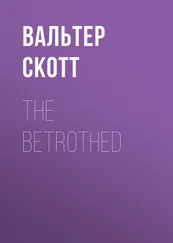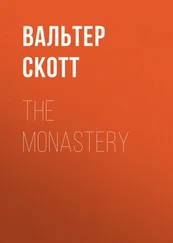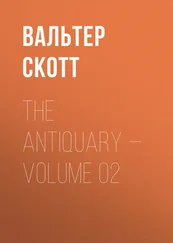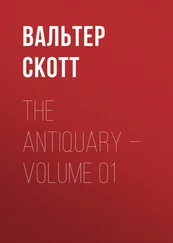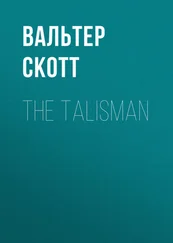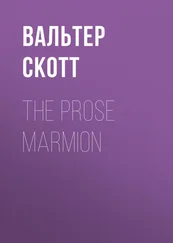Вальтер Скотт - The Fortunes of Nigel
Здесь есть возможность читать онлайн «Вальтер Скотт - The Fortunes of Nigel» — ознакомительный отрывок электронной книги совершенно бесплатно, а после прочтения отрывка купить полную версию. В некоторых случаях можно слушать аудио, скачать через торрент в формате fb2 и присутствует краткое содержание. Жанр: foreign_antique, foreign_prose, Альтернативная история, на английском языке. Описание произведения, (предисловие) а так же отзывы посетителей доступны на портале библиотеки ЛибКат.
- Название:The Fortunes of Nigel
- Автор:
- Жанр:
- Год:неизвестен
- ISBN:нет данных
- Рейтинг книги:4 / 5. Голосов: 1
-
Избранное:Добавить в избранное
- Отзывы:
-
Ваша оценка:
- 80
- 1
- 2
- 3
- 4
- 5
The Fortunes of Nigel: краткое содержание, описание и аннотация
Предлагаем к чтению аннотацию, описание, краткое содержание или предисловие (зависит от того, что написал сам автор книги «The Fortunes of Nigel»). Если вы не нашли необходимую информацию о книге — напишите в комментариях, мы постараемся отыскать её.
The Fortunes of Nigel — читать онлайн ознакомительный отрывок
Ниже представлен текст книги, разбитый по страницам. Система сохранения места последней прочитанной страницы, позволяет с удобством читать онлайн бесплатно книгу «The Fortunes of Nigel», без необходимости каждый раз заново искать на чём Вы остановились. Поставьте закладку, и сможете в любой момент перейти на страницу, на которой закончили чтение.
Интервал:
Закладка:
“Let your husband come to me, good dame,” said the goldsmith, who, with all his experience and worth, was somewhat of a formalist and disciplinarian. “The proverb says, ‘House goes mad when women gad;’ and let his lordship’s own man wait upon his master in his chamber – it is more seemly. God give ye good-morrow.”
“Good-morrow to your worship,” said the dame, somewhat coldly; and, so soon as the adviser was out of hearing, was ungracious enough to mutter, in contempt of his council, “Marry quep of your advice, for an old Scotch tinsmith, as you are! My husband is as wise, and very near as old, as yourself; and if I please him, it is well enough; and though he is not just so rich just now as some folks, yet I hope to see him ride upon his moyle, with a foot-cloth, and have his two blue-coats after him, as well as they do.”
CHAPTER V
Wherefore come ye not to court? Certain ‘tis the rarest sport; There are silks and jewels glistening, Prattling fools and wise men listening, Bullies among brave men justling, Beggars amongst nobles bustling; Low-breath’d talkers, minion lispers, Cutting honest throats by whispers; Wherefore come ye not to court? Skelton swears ‘tis glorious sport. Skelton Skeltonizeth.
It was not entirely out of parade that the benevolent citizen was mounted and attended in that manner, which, as the reader has been informed, excited a gentle degree of spleen on the part of Dame Christie, which, to do her justice, vanished in the little soliloquy which we have recorded. The good man, besides the natural desire to maintain the exterior of a man of worship, was at present bound to Whitehall in order to exhibit a piece of valuable workmanship to King James, which he deemed his Majesty might be pleased to view, or even to purchase. He himself was therefore mounted upon his caparisoned mule, that he might the better make his way through the narrow, dirty, and crowded streets; and while one of his attendants carried under his arm the piece of plate, wrapped up in red baize, the other two gave an eye to its safety; for such was then the state of the police of the metropolis, that men were often assaulted in the public street for the sake of revenge or of plunder; and those who apprehended being beset, usually endeavoured, if their estate admitted such expense, to secure themselves by the attendance of armed followers. And this custom, which was at first limited to the nobility and gentry, extended by degrees to those citizens of consideration, who, being understood to travel with a charge, as it was called, might otherwise have been selected as safe subjects of plunder by the street-robber.
As Master George Heriot paced forth westward with this gallant attendance, he paused at the shop door of his countryman and friend, the ancient horologer, and having caused Tunstall, who was in attendance, to adjust his watch by the real time, he desired to speak with his master; in consequence of which summons, the old Time-meter came forth from his den, his face like a bronze bust, darkened with dust, and glistening here and there with copper filings, and his senses so bemused in the intensity of calculation, that he gazed on his friend the goldsmith for a minute before he seemed perfectly to comprehend who he was, and heard him express his invitation to David Ramsay, and pretty Mistress Margaret, his daughter, to dine with him next day at noon, to meet with a noble young countrymen, without returning any answer.
“I’ll make thee speak, with a murrain to thee,” muttered Heriot to himself; and suddenly changing his tone, he said aloud, – “I pray you, neighbour David, when are you and I to have a settlement for the bullion wherewith I supplied you to mount yonder hall-clock at Theobald’s, and that other whirligig that you made for the Duke of Buckingham? I have had the Spanish house to satisfy for the ingots, and I must needs put you in mind that you have been eight months behind-hand.”
There is something so sharp and aigre in the demand of a peremptory dun, that no human tympanum, however inaccessible to other tones, can resist the application. David Ramsay started at once from his reverie, and answered in a pettish tone, “Wow, George, man, what needs aw this din about sax score o’ pounds? Aw the world kens I can answer aw claims on me, and you proffered yourself fair time, till his maist gracious Majesty and the noble Duke suld make settled accompts wi’ me; and ye may ken, by your ain experience, that I canna gang rowting like an unmannered Highland stot to their doors, as ye come to mine.”
Heriot laughed, and replied, “Well, David, I see a demand of money is like a bucket of water about your ears, and makes you a man of the world at once. And now, friend, will you tell me, like a Christian man, if you will dine with me to-morrow at noon, and bring pretty Mistress Margaret, my god-daughter, with you, to meet with our noble young countryman, the Lord of Glenvarloch?”
“The young Lord of Glenvarloch!” said the old mechanist; “wi’ aw my heart, and blithe I will be to see him again. We have not met these forty years – he was twa years before me at the humanity classes – he is a sweet youth.”
“That was his father – his father – his father! – you old dotard Dot-and-carry-one that you are,” answered the goldsmith. “A sweet youth he would have been by this time, had he lived, worthy nobleman! This is his son, the Lord Nigel.”
“His son!” said Ramsay; “maybe he will want something of a chronometer, or watch – few gallants care to be without them now-a-days.”
“He may buy half your stock-in-trade, if ever he comes to his own, for what I know,” said his friend; “but, David, remember your bond, and use me not as you did when my housewife had the sheep’s-head and the cock-a-leeky boiling for you as late as two of the clock afternoon.”
“She had the more credit by her cookery,” answered David, now fully awake; “a sheep’s-head over-boiled, were poison, according to our saying.”
“Well,” answered Master George, “but as there will be no sheep’s-head to-morrow, it may chance you to spoil a dinner which a proverb cannot mend. It may be you may forgather with your friend, Sir Mungo Malagrowther, for I purpose to ask his worship; so, be sure and bide tryste, Davie.”
“That will I – I will be true as a chronometer,” said Ramsay.
“I will not trust you, though,” replied Heriot. – “Hear you, Jenkin boy, tell Scots Janet to tell pretty Mistress Margaret, my god-child, she must put her father in remembrance to put on his best doublet to-morrow, and to bring him to Lombard Street at noon. Tell her they are to meet a brave young Scots lord.”
Jenkin coughed that sort of dry short cough uttered by those who are either charged with errands which they do not like, or hear opinions to which they must not enter a dissent.
“Umph!” repeated Master George – who, as we have already noticed, was something of a martinet in domestic discipline – “what does umph mean? Will you do mine errand or not, sirrah?”
“Sure, Master George Heriot,” said the apprentice, touching his cap, “I only meant, that Mistress Margaret was not likely to forget such an invitation.”
“Why, no,” said Master George; “she is a dutiful girl to her god-father, though I sometimes call her a jill-flirt. – And, hark ye, Jenkin, you and your comrade had best come with your clubs, to see your master and her safely home; but first shut shop, and loose the bull-dog, and let the porter stay in the fore-shop till your return. I will send two of my knaves with you; for I hear these wild youngsters of the Temple are broken out worse and lighter than ever.”
“We can keep their steel in order with good handbats,” said Jenkin; “and never trouble your servants for the matter.”
Читать дальшеИнтервал:
Закладка:
Похожие книги на «The Fortunes of Nigel»
Представляем Вашему вниманию похожие книги на «The Fortunes of Nigel» списком для выбора. Мы отобрали схожую по названию и смыслу литературу в надежде предоставить читателям больше вариантов отыскать новые, интересные, ещё непрочитанные произведения.
Обсуждение, отзывы о книге «The Fortunes of Nigel» и просто собственные мнения читателей. Оставьте ваши комментарии, напишите, что Вы думаете о произведении, его смысле или главных героях. Укажите что конкретно понравилось, а что нет, и почему Вы так считаете.
